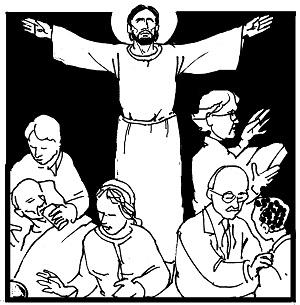
“The greatest among you must be your servant” (Matt 23:12).
Is 1:10, 16-20: Matt 23:1-12
During the 10 years of his papacy, Pope Francis has often made clear that he was not asking his fellow bishops to abandon traditional ideals, but to consider the real problems millions of Catholics are facing and to ask how church teaching can be more effectively and compassionately applied at the pastoral level.
He has led the way as a pastor by being slow to judge and eager to immerse himself in the common experience of people by first walking with them, listening to their problems, asking them questions and sharing their frustrations. Before offering guidance, he wanted a community listening to one another, the Spirit and the reality of their lives. He has set in motion a journey toward a “synodal” church, with all its members walking, talking and encountering one another about the complexity of life in the modern world.
Since his election in 2013, Pope Francis has dreamed of this synodal church as the fulfillment of the ecumenical council called by Pope John XXIII in 1959. A grand fortress of truth standing aloof from the real world could not preach the Gospel or attract the contemporary world. It could not dialogue with separated brothers and sisters in other faith communities. It had to master the art of listening and dialogue if it was to overcome its self-absorbed isolation and defensiveness.
To accomplish this, both John and Francis have asked their fellow bishops to consider their primary role to be as pastors among their people, especially those who have felt left behind, lost and alienated from their church.
In today’s Gospel, we hear Jesus telling his disciples that leadership is always about service. As leaders they were not to lord it over others or burden them, but to serve them and take their burdens on themselves. Where structures and rules were necessary, they should be applied with patience and understanding that we grow gradually toward maturity and its ideals. Everyone, especially a leader, is a work in progress. We are all sinners, as Pope Francis has said of himself, living by mercy and unable to judge the motives or consciences of others.
What Jesus was describing was a church of mercy, a family in which the strong support the weak, a house that welcomes everyone and where forgiveness is the rule and not the exception. The call to love has always been more complicated than legal compliance. Because we never arrive at perfection in love; we can only keep trying, asking for and giving forgiveness along the way. This is the community Jesus modeled as our crucified and risen Lord.
Jesus upheld legitimate authority and office, but warned his disciples that credibility meant practicing what they preached. The trappings of power – special robes, reserved places at table, titles, offices and formal authority became meaningless if leaders did not lead by example or show that they, too, have carried the burdens they ask others to carry.
Jesus exhibited a different kind of leadership by serving others and placing his own life on the line for the message he preached. We look for his model of authority in any organization, whether it is among our bishops or in a company, a cause or a church. Real leadership resides in those who do the work, bear the burdens, serve from within and give themselves for the common good. All the rest is just talk.
You have but one teacher, and you are all brothers.
Call no one on earth your father;
you have but one Father in heaven.
Do not be called 'Master';
you have but one master, the Christ.
The greatest among you must be your servant.
Whoever exalts himself will be humbled;
but whoever humbles himself will be exalted (Matt 23:10-12).





